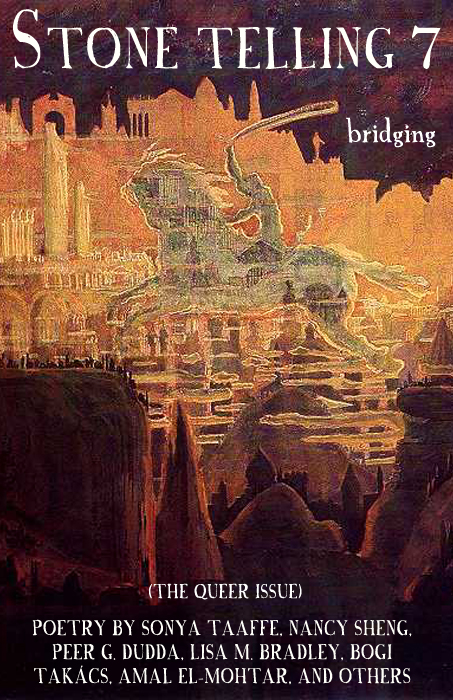April is National Poetry Month—Tor.com has already been celebrating!—and that’s a perfect reason to turn Queering SFF toward a genre that I too-frequently forget to include: speculative poetry. Plus, the timing couldn’t be more serendipitous, because Rose Lemberg and Shweta Narayan’s speculative poetry magazine Stone Telling has recently released its seventh issue, a queer-themed installment titled “Bridging.“
For those unfamiliar with Stone Telling, it is a spec-poetry magazine with a lean toward “work that is multi-cultural and boundary-crossing, work that deals with othering and Others, work that considers race, gender, sexuality, identity, and disability issues in nontrivial and evocative ways.” They are a consistent haunt of mine when I’m looking for great speculative poetry, and while queer poems are a regular feature of the magazine, this is the first issue entirely devoted to queerness—not only in terms of sexuality but also gender.
Suffice to say, I loved it, and here’s why.
(One disclaimer: the second half of my article on Joanna Russ’s early poems, “The Poetry of Joanna Russ: Poems 1954-1957,” does appear in this issue.)
In their introductory editorial, Rose Lemberg and Shweta Narayan say:
Here you will find poems with speakers or protagonists who are lesbian, gay, bisexual, genderqueer, trans*, asexual, and neutrois. These poems have been written by both queer-identified people and allies, and this is as it should be: we strongly felt that limiting the issue to only openly/publicly queer poets would turn away some powerful and important work by allies and people who are, for a variety of reasons, not ready to openly speak of their queerness. On the other hand, we also strongly felt the need to feature and highlight work by queer-identified writers. [ ] We hope that the poems in this issue will inspire and empower others to write what is in their hearts and to know that in this work, they are not alone.
The variety of speakers and tales-told in these poems is fabulous, inspiring, and evocative. In the closing roundtable discussion, Julia Rios interviews the contributors on their work, their identities, and why they’ve contributed to this issue of Stone Telling; the answers are as varied as their poems, and contribute a deeper layer of interpretation for me as a reader. The inclusion of several genderqueer poems alongside poems about such things as a woman astronaut’s wife embroidering her spacesuit before her mission, a trans man negotiating the gendered symbolism of moons and reproductive organs, and the performance of gender with regards to appearance—among other things—is particularly pleasing. Lemberg and Narayan’s editorial choices illustrate a wide range of bridges and acts of bridging between silence and speech—the secondary theme of this collection of queer speculative poetry.
And, while I found all of these works rewarding and stunning in different ways, there were a few poems that stood out to me and stuck in my head for a long while after reading (and listening; don’t forget to listen to the amazing recordings provided!). Sonya Taaffe’s “The Clock House,” a poem about Alan Turing, was particularly gutting—while Turing’s life and death never fail to provoke an emotional reaction in me, her particular angle of engagement and her framing of his relationships and identity struck a strong chord. “The Handcrafted Motions of Flight,” by Bogi Takács, is a genderqueer poem with alternate pronouns, a fascinating resistance to government from the inside, and the strongest speculative grounding of the lot, for me. The central figure of the poem sees forward to past lives, including one in particular, where the life in question is lived by a neutrois incarnation of themselves, saying: “I had to assemble everything from pieces/and I could not chance upon a gender/until I realized that was a gender in itself.”
Another stand-out is the epic length poem by Lisa M. Bradley, “we come together we fall apart,” that features a range of protagonists and a range of sexual/gender identities within them, also in many ways unified—but I won’t spoil the poem’s arc; simply trust me when I say the complexity of fluid identity and containing multitudes is fully at work in the thematic resonance Bradley evokes.
The issue also contains nonfiction: the second half of my Russ poetry article, to be skipped over in this context, and an article by B. titled “What ‘queer’ could look like in Hindi: translated poetry and queerness in regional tongues.” This article is a complicated and thought-provoking look at the ways in which silencing via the denial of the very basic words to speak about queerness occurs, and the ways in which the alternate is also problematic: when queerness can only be spoken about in English. The cultural perspectives in this issue of Stone Telling are international and multinational in several instances, but B.’s article in particular was a broadening thing for me to read, to consider the ways in which queer identity is mediated by language and culture.
Stone Telling: Bridging is a must-read for fans of queer speculative work—and if you aren’t much of a poetry reader, I suspect you will be after giving this issue a try. It is National Poetry Month, after all—and poetry often captures moments of intense emotion and significance in ways that fiction can’t quite manage. For queer folks, this embodiment in language of our intense moments, our significance, hell: our existence, is valuable and beautiful. Go give it a look. (Also, the magazine runs on a tip-jar model, so if you like what you see and want more queer speculative poetry, considering putting a few dollars in.)
Lee Mandelo is a writer, critic and occasional editor whose primary fields of interest are speculative fiction and queer literature, especially when the two coincide. Also, comics. She can be found on Twitter or her website.










